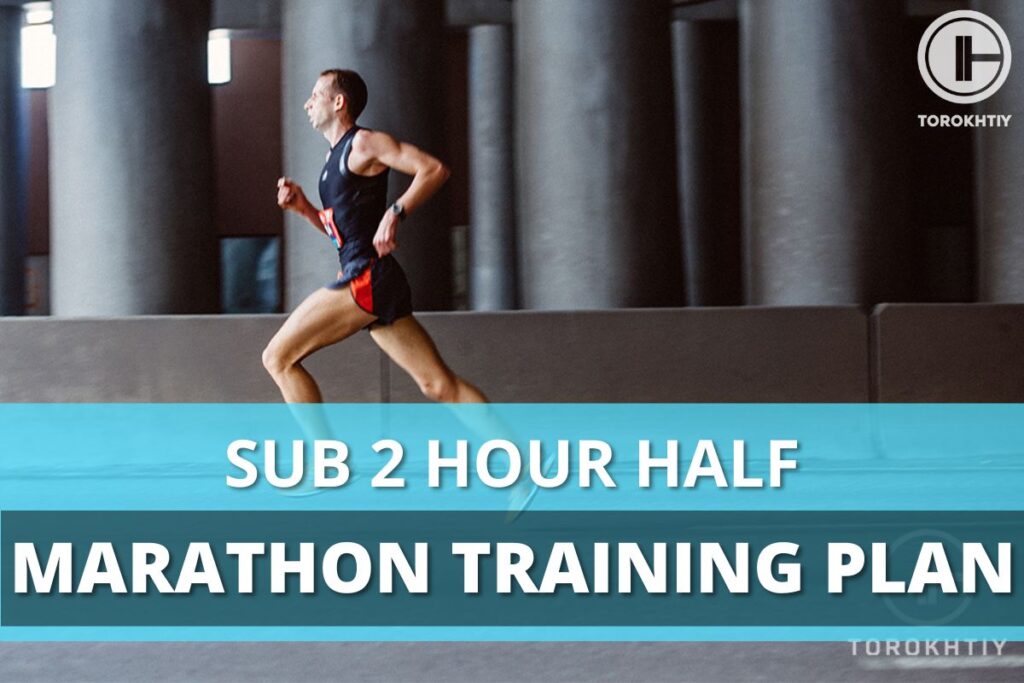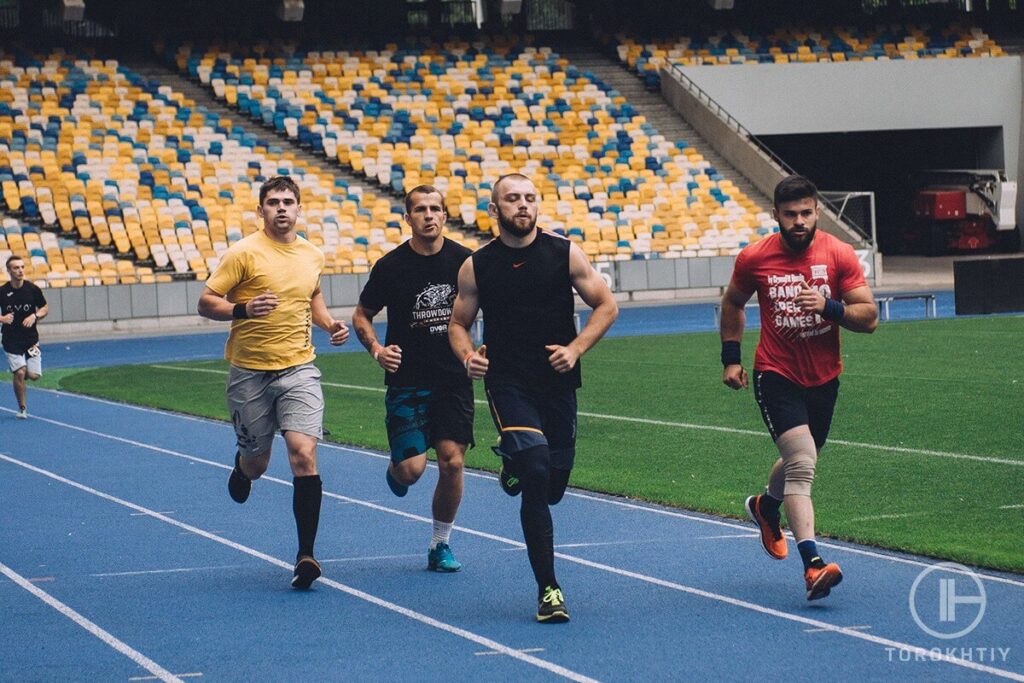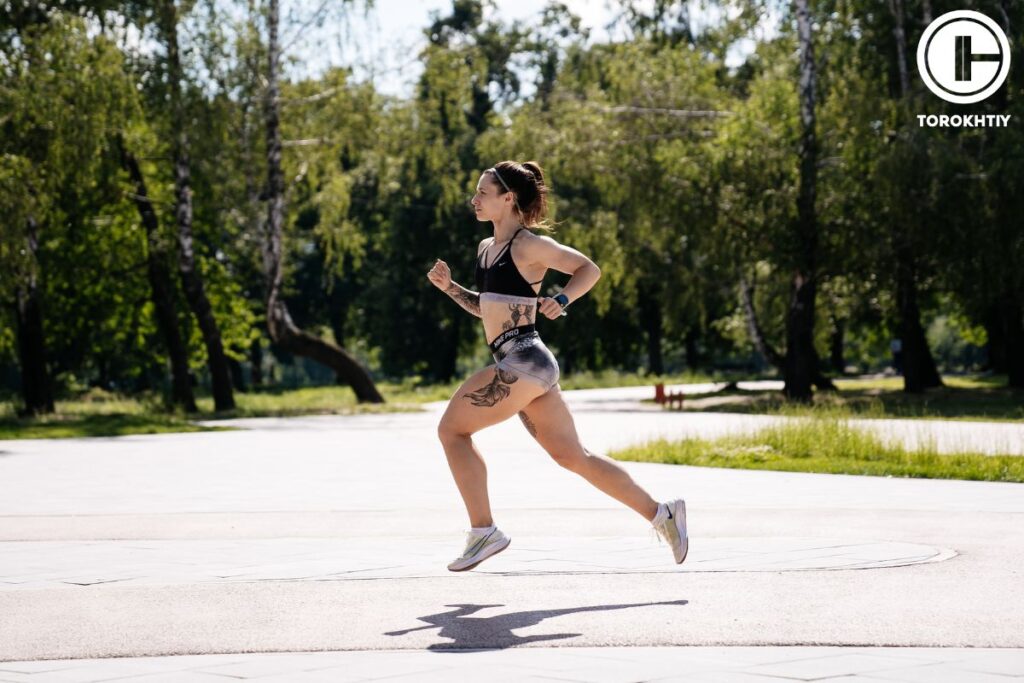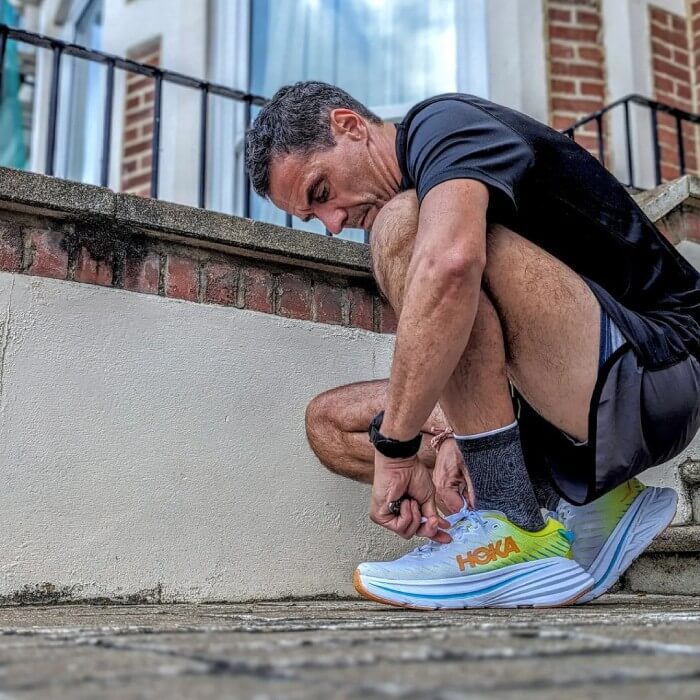Sub 2 Hour Half Marathon Training Plan: A Detailed Guide to All Skill Levels
Author:
Unlock your full potential by engaging with our experts and community! Have questions about your fitness journey or looking for expert advice on weightlifting techniques? Don’t hesitate — leave a comment below and Oleksandr Zagrebelnyi will provide a personalized answer and insights to help you reach your goals.
Torokhtiy is reader-supported. Some links are affiliate links, and we may earn a commission at no extra cost to you. See our disclosure page for details.
Are you interested in running a half marathon in under 2 hours? It’s a challenging but achievable goal with a proper sub 2 hour half marathon training plan, nutrition, and a clear mindset. Running a half marathon is an accomplishment, but breaking the 2-hour mark is a common goal for many runners.
What is the best 12 week sub 2 hour half marathon training plan? Want to know all the details? This article will give you all the information you need, whether you are a beginner, a mid-level runner, or an experienced athlete. Let’s dive in!
Running a half marathon in 2 hours is a challenging task requiring a proper training plan with different loads, good rest, a healthy nutrition strategy, and sufficient hydration. However, with certain training tips, you can increase your endurance to complete this distance.

Intro to Sub 2 Hour Half Marathon
A half marathon is a road running event that covers a distance of 21.0975 kilometers or 13.1094 miles. It is a challenging race that requires endurance and stamina, and completing a half marathon is a significant achievement for any runner.
Running a half marathon requires considerable dedication, training, and hard work. It is a challenging feat that tests a runner’s physical and mental strength. However, the reward of completing a half marathon is worth the effort.
A sub 2 hour half marathon is a common goal for many runners. This means completing the race in under 2 hours, which demands a high level of dedication and hard work. Runners must train regularly, build endurance, and focus on speed work. It is also important to have a solid nutrition plan and adequate rest to support the physical demands of training.

Who Can Run a Sub 2 Hour Half Marathon? Answering the 2 Main Questions
While it is a challenging goal, it is definitely achievable for most seasoned runners. It requires a certain level of endurance and stamina to run 13.1 miles in under 2 hours. Anyone who’s willing to put in the effort can run a sub 2-hour half marathon.
However, it’s important to note that this challenging goal requires a certain level of fitness and running experience. If you’re new to running, building up your endurance and speed might take some time before attempting to run a sub 2-hour half marathon.
For those who have been running for a while, a sub 2-hour half marathon is a good challenge. It’s a great way to push yourself and see how far you can go. Running a sub 2-hour half marathon requires hard work, determination, and discipline. You must be committed to your training plan and stay focused on your goal.
1. What Physical Fitness Do You Need to Have?
To run a sub 2 hour half marathon, you need to have good cardiovascular fitness, muscular endurance, and overall strength. You should be able to comfortably run 10 miles or more and maintain a good pace throughout. Interval training, tempo runs, and hill workouts are essential to building the physical fitness required for a sub 2 hour half marathon. Additionally, you need to have strong leg muscles and good cardiovascular endurance.
If you’re not currently at this fitness level, don’t worry. You can work towards it with a structured training plan. This plan should include a mix of different types of runs, including long runs, speed work, and tempo runs. You should also incorporate strength training exercises to help build your leg muscles and improve your overall fitness.

2. Do You Need to Prepare for a Sub 2 Hour Half Marathon?
Yes, preparation is key to achieving a sub 2 hour half marathon. You should follow a well-structured training plan that includes a mix of running workouts, strength training, and recovery days. Pay attention to your nutrition and hydration, rest, and recovery.
Preparing for a sub 2-hour half marathon requires a lot of dedication and discipline. You need to commit to your training plan and make sure you stick to it. It also means fueling your body with the right foods and staying hydrated.
2 Hour Half Marathon Pace
What is the pace for a sub 2 hour half marathon? A half marathon is a long-distance race that covers 13.1 miles or 21.0975 kilometers. The average time to complete a half marathon is around 2 hours, but this can vary depending on several factors such as age, gender, fitness level, and terrain.
The average pace for a 2 hour half marathon is 9 minutes and 9 seconds per mile or 5 minutes and 40 seconds per kilometer. However, the best pace for a half marathon can vary greatly depending on the runner’s fitness level and training.
The average beginner pace for a half marathon is 10 minutes per mile, so if you only start to run, you need some practice to finish a half marathon in 2 hours.
For experienced runners, sub 2 hours half marathon is a rather easy task, as their pace can range from 7 minutes and 30 seconds to 8 minutes and 30 seconds per mile or 4 minutes and 39 seconds to 5 minutes and 16 seconds per kilometer.
This pace requires consistent training and a high level of fitness.
It is important to note that the pace for a half marathon can vary depending on the terrain of the race. Running on flat terrain can result in a faster pace, while hilly terrain can slow down the pace.
Running a Half Marathon in 2 Hours: Key Factors to Know
To start, it is important to establish a solid base of running fitness. This can be done by gradually increasing mileage and incorporating speed work and hill training. A good goal for the base training period is to run at least 3-4 times per week with a long run of at least 8 miles.
Once a solid base has been established, it is important to incorporate more specific training into your plan. This includes tempo runs, interval training, and race-pace runs. These workouts will help build endurance and speed, crucial for achieving a sub-2 hour half marathon.

Let’s take a closer look at the main components of your training plan:
1. Training
A well-planned and structured training program is one of the most important factors in achieving a sub 2-hour half marathon. Strength training exercises such as squats, lunges, and core workouts can help improve your running form, speed, and endurance.
Your training program should include a combination of speed work, tempo runs, and long runs to help you build endurance, increase your speed, and maintain your pace.
Consistency and discipline are key to achieving this goal, and you must be willing to put in the time and effort required to succeed. Aim to run at least four times a week and gradually increase your miles. A good rule of thumb is to increase your mileage by no more than 10% each week to avoid injury.
2. Nutrition
Proper nutrition is another important factor in achieving a sub 2-hour half marathon. You must fuel your body with nutrient-dense foods that provide sufficient carbohydrates, protein, and healthy fats. This will help you perform better during your training sessions and race day.
Stay hydrated by drinking plenty of water and electrolyte-rich drinks. Avoid processed foods, sugary drinks, and alcohol, as they can negatively affect your performance.
Consider taking supplements such as B vitamins, iron, and magnesium to help support your body during training and on a race day. However, make sure to consult your healthcare provider before taking any supplements.

3. Mental Preparation
Running a sub 2-hour half marathon requires physical strength and mental toughness. Training your mind to stay focused, motivated, and positive during the race is crucial. Many runners use visualization techniques to imagine completing the race in under two hours.
It’s also essential to have a race strategy, such as breaking the race into smaller segments and setting achievable goals, to help you stay on track.
Joining a running group or running with a partner can help you stay motivated. Remember to celebrate your small wins, such as achieving a new personal record or running your longest distance.
4. Race Day
On race day, stick to your strategy and start at a pace you can maintain for the entire race. Don’t start too fast, or you risk burning out before the finish line. Stay hydrated throughout the race, and fuel your body with energy gels, bananas, or other easily digestible foods. You can also use the aid stations to rehydrate and replenish your energy.
Remember to keep a positive attitude and stay motivated, even when the race gets tough. You’ve trained hard for this, and you can do it!

5. Racing Tips
During your half marathon race, there are some tips you can follow to help you achieve your goal of running a sub 2-hour half marathon. Here are some racing recommendations:
- Start Slowly: Starting too fast can lead to burning out before the finish line. Begin at a comfortable pace and build up your speed gradually. The goal is to maintain a consistent pace throughout the race.
- Keep Hydrated: It’s important to keep hydrated throughout the race. Take advantage of the water and energy drink stations along the way. Make sure to drink enough fluids to avoid dehydration.
- Fuel Your Body: It’s important to fuel your body with easily digestible foods such as energy gels, bananas, or other snacks. Test your fueling strategy during your race to find what works best for you.
- Break the Race into Segments: Breaking the race into smaller segments can help you stay motivated and focused. Set achievable goals for each segment and celebrate each one you achieve.
- Stay Positive: A positive attitude can significantly impact your performance. Focus on the positive aspects of your race and motivate yourself to keep pushing towards your goal.
6. Recovery
After the race, it’s essential to allow your body to recover properly. Here are some tips to help you recover more efficiently:
- Refuel: Replenish your body with carbohydrates and protein to help your muscles recover. Opt for nutrient-dense foods such as fruits, vegetables, lean protein, and whole grains.
- Rest: Your body needs time to recover. Get plenty of sleep and allow yourself to rest for a few days after the race.
- Stretch: Stretching can help improve your flexibility and prevent tightness and soreness. Make sure to stretch your major muscle groups after the race.
- Cross-Train: Cross-training can help you maintain your fitness level while giving your body a break from running. Consider activities such as swimming, cycling, or yoga.
Training Plan for a Marathon in 2 Hours
Training for a sub two hour half marathon involves a lot of planning and preparation. Runners must create a training plan that includes a balance of running, strength training, and rest days.
They need to gradually increase the distance and intensity of their runs to build endurance and improve their speed. Runners should also focus on their form and technique to improve their efficiency and reduce the risk of injury.
Following a structured training plan is essential to achieving your goal of running a half marathon under 2 hours. This training plan provides a balanced approach that includes various types of runs and cross-training to help you improve your fitness, endurance, and speed.
1. Weekly Training Plan
The weekly training plan to help you improve your fitness and endurance gradually.
Table with Weekly Workout Plan
| Monday | Tuesday | Wednesday | Thursday | Friday | Saturday | Sunday | |
|---|---|---|---|---|---|---|---|
| Week 1-2 | Rest day | Tempo runs 30 min + slow pace 30 min | Cross training | Interval training 50 min | Strength training | Rest day | Long run 70-80 min |
| Week 3-4 | Rest day | Tempo runs 40 min + slow pace 40 min | Cross training | Interval training 60 min | Strength training | Tempo runs 40 min + slow pace 40 min | Long run 90-100 min |
| Week 5-6 | Rest day | Tempo runs 40 min + slow pace 60 min | Cross training | Interval training 70 min | Strength training | Tempo runs 40 min + slow pace 50 min | Long run 110-120 min |
For every workout:
- Warm-up: 10 minutes of walking or jogging at an easy pace.
- Cool-down: 10 minutes of walking or jogging at an easy pace with deep calm breathing.
2. Monthly Training Plan
The training plan is spread over 12 weeks, with each week having a specific focus to help you improve your fitness and endurance gradually.
Table with the training plan over 12 weeks
| Monday | Tuesday | Wednesday | Thursday | Friday | Saturday | Sunday | |
|---|---|---|---|---|---|---|---|
| Week 1 | Rest day | Interval runs | Cross training | Easy runs | Rest day | Strength training | Long run |
| Week 2 | Rest day | Tempo runs | Strength training | Easy runs | Rest day | Cross training | Long run |
| Week 3 | Rest day | Interval runs | Cross training | Easy runs | Rest day | Strength training | Long run |
| Week 4 | Rest day | Tempo runs | Strength training | Easy runs | Rest day | Cross training | Long run |
| Week 5 | Rest day | Easy runs | Cross training | Easy runs | Rest day | Strength training | Long run |
| Week 6 | Rest day | Interval runs | Strength training | Easy runs | Interval runs | Cross training | Long run |
| Week 7 | Rest day | Tempo runs | Cross training | Easy runs | Rest day | Strength training | Long run |
| Week 8 | Rest day | Interval runs | Strength training | Easy runs | Interval runs | Cross training | Long run |
| Week 9 | Rest day | Tempo runs | Cross training | Easy runs | Rest day | Strength training | Long run |
| Week 10 | Rest day | Interval runs | Strength training | Easy runs | Interval runs | Cross training | Long run |
| Week 11 | Rest day | Tempo runs | Cross training | Easy runs | Interval runs | Strength training | Long run |
| Week 12 | Rest day | Interval runs | Easy runs | Rest day | Easy runs | Rest day | Long run |
The final week is all about tapering and recovery, which involves reducing the intensity and volume of your training to allow your body to rest and recover before the race.
Hoka Bondi 8
- Material: Breathable and supportive mesh upper
- Sole Material: Full-length EVA midsole for maximum cushioning
- Outsole (tread feature): Durable rubber outsole with a unique lug pattern
- Drop: 4mm
- Season: Suitable for all seasons
- Special Features: Exceptional cushioning and comfort
- Size: Available in various sizes
- Type: Maximum cushioning running shoe
If you want excellent running or walking shoes or just footwear you’ll be comfortable in, you can’t go wrong with the Hoka Bondi 8.
It’s been upgraded and now they have lighter, softer materials and a new extended heel design. The heel design gives a super soft, balanced feeling from th emoment your heel hits the ground to when you push off with your toes.
As far as the weight goes, it’s around 10.80 ounces, and the heel drop is 4 mm. They’re not too heavy and the lower drop is a good balance between cushioning and feeling connected to the ground.
The Bondi 8 is focused on cushioning and keeps things simple. There’s a good amount of support without any extra stuff that you don’t really need and that would only jack up the price. Take the rear crash pad, for example – it makes for a soft, smooth ride, which is perfect if you like to run outdoors.

The upper part is made of engineered mesh, which is breathable and keeps your feet cool and dry. The tongue and collar have memory foam and mold to your foot shape. All of these features make the fit snug but flexible, which is exactly what you would want.
The Bondi 8 is eco-friendly because it uses recyclable materials in parts like the mesh and the sockliner. Plus, the shoes are completely vegan, which (if that’s important to you) is nice!
FAQ: Half Marathon Time and Pace
Is Under 2 Hours a Good Half Marathon?
Yes, running a half marathon in under 2 hours is considered a good time for many runners. However, it’s important to remember that everyone’s abilities and goals are different. The most important thing is to set a challenging but achievable goal for you and work towards it with dedication and consistency.
What Pace for a 2 Hour Half Marathon?
To run a half marathon in 2 hours, you need to maintain a pace of 9 minutes and 9 seconds per mile or 5 minutes and 40 seconds per kilometer.
Conclusion
Completing a sub 2 hour half marathon is a challenging goal, but it is achievable with dedication and hard work. Many runners find that training for and completing this race is a rewarding experience that pushes them to reach their full potential. It is an opportunity to challenge themselves, push their limits, and achieve a significant accomplishment.
With proper preparation, healthy eating, and rest, you can reach this goal. To do this, you need to do combined workouts in order to develop strength, speed, and endurance.
Do you have a sub 2 hour half marathon training plan? Share some details in the comments below.
References:
- Nutrition and Supplement Update for the Endurance Athlete: Review and Recommendations // PMC: https://www.ncbi.nlm.nih.gov/pmc/articles/PMC6628334/
- Training for a (half‐)marathon: Training volume and longest endurance run related to performance and running injuries // PMC: https://www.ncbi.nlm.nih.gov/pmc/articles/PMC7496388/
- Training and Racing Behavior of Recreational Runners by Race Distance—Results From the NURMI Study (Step 1) // PMC: https://www.ncbi.nlm.nih.gov/pmc/articles/PMC7890117/
- High-intensity interval versus moderate-intensity continuous half-marathon training programme for middle-aged women // PubMed: https://pubmed.ncbi.nlm.nih.gov/32193662/
- Training for a (half‐)marathon: Training volume and longest endurance run related to performance and running injuries // PMC: https://www.ncbi.nlm.nih.gov/pmc/articles/PMC7496388/
- Photos by Torokhtiy Media Team.
Why Trust Us?
With over 20 years in Olympic weightlifting, strength training, nutrition coaching, and general fitness our team does its best to provide the audience with ultimate support and meet the needs and requirements of advanced athletes and professional lifters, as well as people who strive to open new opportunities and develop their physical capabilities with us.
By trusting the recommendations of our certified experts in coaching, nutrition, and sports training programming, as well as scientific consultants, and physiotherapists, we provide you with thorough, well-considered, and scientifically proven content. All the information given in the articles concerning workout programming, separate exercises, and athletic performance, in general, is based on verified data.
The product testing process is described in more detail here.
Oleksandr is a running coach and member of the Nike Run Club coaching team for 8 years. A participant in national and international competitions at distances from one kilometer to the ultra trail. Owner of mountain trail running camps. Nowadays Oleksandr is responsible for creating running training programs for athletes of various levels, coaching personally offline and online, conducts trail running camps in the mountains, participates in competitions.




Still have questions after reading our article? Unlock your full potential by engaging with our experts and community! Don’t hesitate — leave a comment below and Oleksandr Zagrebelnyi will provide a personalized answer and insights to help you reach your goals.